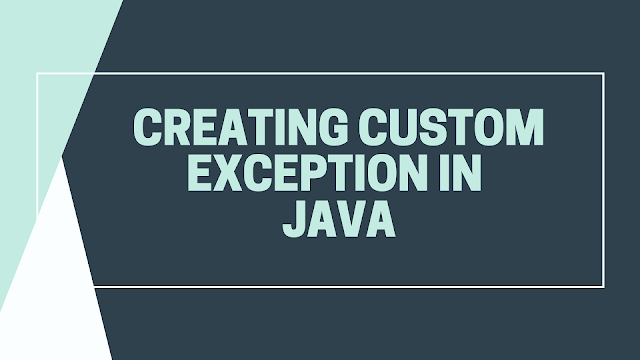Custom Checked and Unchecked Exception in Java with Examples
 |
| Custom checked and unchecked exception in java |
What is Exception Handling?
Exception is unwanted event that interrupts the normal flow of program. When Exception is occurs during program execution it gets terminated.
Learn more in details about Exception and how to handle Exception :-
What is Custom Exception in Java?
If we create our own Exception, then it is known as Custom Exception. Custom exception are also known as user-defined Exception, because it is defined by us.
Why you need Custom Exception?
- You can provide your own exception message which can be easily understandable by client rather than java's exception message sometimes which may be hard to understand .
- If you need an exception type that isn't represented by those in the Java platform.
- If it help users if they could differentiate your exceptions from those thrown by classes written by other vendors.
- If your code throw more than one related exception.
- You can add own methods in custom exception class.
- Custom exceptions provide you the flexibility to add attributes and methods that are not part of a standard Java exception.
- You can handle different Exceptions differently with different catch blocks.
Create custom exception with Checked exception
If you want to create checked custom exception, then you must handle the exception otherwise java compiler does not compile your java code.
Lets see example of it so you will better understand about it.
Example 1 :- Custom Checked Exception in Java
InvalidNameException.java
package ExceptionDemo;
public class InvalidNameException extends Exception {
public InvalidNameException(String exceptionMessage) {
super(exceptionMessage);
}
}
CustomExceptionDemo.java
package ExceptionDemo;
import java.util.Scanner;
public class CustomExceptionDemo {
public static void main(String[] args) {
Scanner sc = new Scanner(System.in);
String name = "";
System.out.println("Enter name with Capital letter Only");
name = sc.nextLine();
try {
String printName = validateName(name);
System.out.println(printName);
} catch (InvalidNameException e) {
e.printStackTrace();
}
System.out.println("End of Code");
}
private static String validateName(String name) throws InvalidNameException {
if (name.isEmpty()) {
throw new InvalidNameException("Please Enter Name");
} else if (!name.equals(name.toUpperCase())) {
throw new InvalidNameException("Please Enter in UpperCase letter Only");
}
return name;
}
}
Output :-
Enter name with Capital letter Only
JAVA BLOG
Output :- JAVA BLOG
End of Code--------------------Enter name with Capital letter Only
java blog
ExceptionDemo.InvalidNameException: Please Enter in UpperCase letter Only
End of Code
at ExceptionDemo.CustomExceptionDemo.validateName(CustomExceptionDemo.java:26)
at ExceptionDemo.CustomExceptionDemo.main(CustomExceptionDemo.java:14)--------------------
Enter name with Capital letter Only
ExceptionDemo.InvalidNameException: Please Enter Name
End of Code
at ExceptionDemo.CustomExceptionDemo.validateName(CustomExceptionDemo.java:24)
at ExceptionDemo.CustomExceptionDemo.main(CustomExceptionDemo.java:14)
- When we enter name with capital then it print name without throwing Exception.
- When we enter name in small case then it will throw new checked custom exception InvalidNameException with message "Please Enter in UpperCase letter Only".
- When we not enter anything and enter then it will count as empty value and we get InvalidNameException with message "Please Enter Name".
In above code, we extends Exception that is checked exception.
So, we must handle the checked exception with trows or using try catch block.
Now lets see how custom exception works with unchecked exception.
Example 2 :- Custom Unchecked Exception in Java
InvalidNameException.java
package ExceptionDemo;
public class InvalidNameException extends RuntimeException {
public InvalidNameException(String exceptionMessage) {
super(exceptionMessage);
}
}CustomExceptionDemo.java
package ExceptionDemo;
import java.util.Scanner;
public class CustomExceptionDemo {
public static void main(String[] args) {
Scanner sc = new Scanner(System.in);
String name = "";
System.out.println("Enter name with Capital letter Only");
name = sc.nextLine();
String printName = validateName(name);
System.out.println("Output :- " + printName);
System.out.println("End of Code");
}
private static String validateName(String name) throws InvalidNameException {
if (name.isEmpty()) {
throw new InvalidNameException("Please Enter Name");
} else if (!name.equals(name.toUpperCase())) {
throw new InvalidNameException("Please Enter in UpperCase letter Only");
}
return name;
}
}
Output :-
Enter name with Capital letter Only
JAVA BLOG
Output :- JAVA BLOG
End of Code-------------------Enter name with Capital letter Only
java blog
Exception in thread "main" ExceptionDemo.InvalidNameException: Please Enter in UpperCase letter Only
at ExceptionDemo.CustomExceptionDemo.validateName(CustomExceptionDemo.java:24)
at ExceptionDemo.CustomExceptionDemo.main(CustomExceptionDemo.java:14)-------------------Enter name with Capital letter Only
Exception in thread "main" ExceptionDemo.InvalidNameException: Please Enter Name
at ExceptionDemo.CustomExceptionDemo.validateName(CustomExceptionDemo.java:22)
at ExceptionDemo.CustomExceptionDemo.main(CustomExceptionDemo.java:14)
You can see in above code we extends RuntimeException that is unchecked exception. Java compiler does not force us to handle RunTimeException.
It is depend on us if we want to handle or not RunTimeException. In above code we did not handle the exception with try catch block so "End of Code" is not printed in output.
Happy Coding.
Other Java Exception Articles you may like :-
Comments
Post a Comment